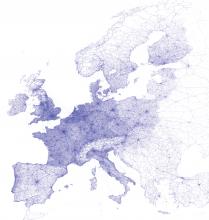
The company says this will allow traffic management companies and consultants to better understand and plan their projects.
The use of such data improved afternoon peak hour congestion by 14% on Hoddle Street in Melbourne, the company claims.
John Cardoso, Intelematics’ senior product manager, says it shows traffic flow, speed, speed limits and delays by correlations between suburbs and street names, kilometres per hour, geographic coordinates and time of day.
“The data is available in 15-minute increments. However, if customers need nine-minute, six-minute, or three-minute increments we have that too,” he continues.
“In addition, each file purchased captures one year’s worth of traffic flow data – many companies only offer three months.”
From April, Intelematics is to roll out traffic data by month consecutively in a move which it says will allow users to access analyse 2020 road and traffic projects without having to wait a full year.
It will also launch historical traffic volume data files showing vehicle counts in all directions across the road network in 15-minute intervals by month, year and suburb from July 2020.
“The data we capture provides context around traffic trends, accident blackspots, the most congested areas, the most dangerous roads and more,” Cardoso adds.
The files are available on the Intelematics website.









